When Col. Chris Dixon recalls his unit's battalion’s 2011 deployment to Afghanistan, he doesn't dwell on the it’s not a grainy 40-second war-zone video that made international headlines that he remembers most. No, Dixon says, 3rd Battalion, 2nd Marines made tangible progress in what was a hotly contested part of Helmand province, a vast area that stretched from region that It’s work Dixon says had a positive long-term effects on the region, which stretched from Musa Qala to Now Zad. During those seven months, he said, they bravely fought of the war's Instead, the former commander of 3rd Battalion, 2nd Marines, said he recalls the great work his young noncommissioned officers carried out across two vast districts north of Sangin, a volatile region where Marines fought their toughest battles that had long-term effects in Afghanistan.
"The squad leaders were the people that I focused on because we were going to be so dispersed," Dixon told Marine Corps Times in his first interview since the unit became embroiled in controversy. "I charged all the squad leaders — regardless of rank — to be mature and responsible."
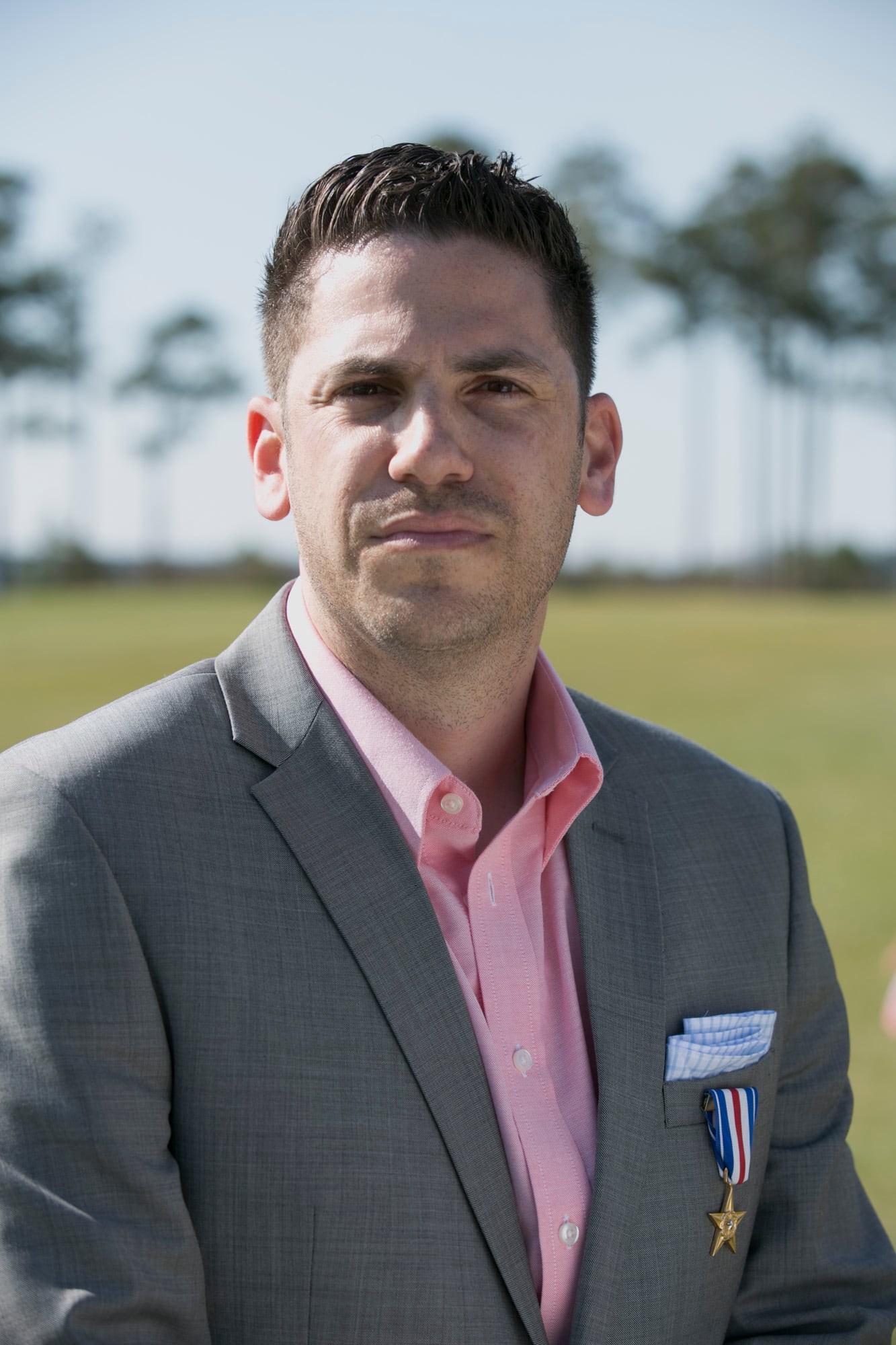
Former Sgt. Matthew Parker
Photo Credit: Daniel Woolfolk/Staff
On Friday, Veteran Sgt. Matthew Parker was one of those squad leaders, Sgt. Matthew Parker,. On Friday, he was presented with a Silver Star during a ceremony at Camp Lejeune, North Carolina. He's the second 3/2 Marine from Dixon’s battalion in recent weeks to be recognized for heroism during that combat tour the 2011 deployment.
It's been nearly five years since Parker, who has since left the Marine Corps, after he led his platoon out of an intense firefight in Musa Qala. His commander and another squad leader were injured during the battle, and Parker took charge, striking several of the enemy's positions until they were forced to retreat. was presented with the prestigious Silver Star. Last month, Staff Sgt. Nathan Hervey, who was a scout sniper section leader with 3/2, received the Bronze Star with "V" for his actions during the same battle. Hervey, who was a sergeant at the time, is credited with taking out an enemy position to which helped save his fellow Marines.
Both men, Dixon said, Dixon called the actions displayed courage, thoughtfulness and leadership. by those Marines "Exactly what you want in a Marine sergeant," he said.
"It was one of those great stories you read about all the time, and here it was happening in our battalion," said Dixon, now the chief of staff for Joint Task Force Civil Support, which oversees the military's first responders for chemical, biological and nuclear incidents, at Fort Eustis, Virginia. "It was an ugly day and [Parker's] actions inspired everybody. He was running around coordinating fire, motivating people, keeping them pressing forward."
It’s unfortunate though, he added, that such stories of success his battalion’s successes were later overshadowed by the controversy when a 39-second video clip surfaced in January 2012 that showed four snipers with his battalion urinating on enemy corpses.
Parker’s Silver Star, which Dixon said is the last of the battalion’s administrative delays, brings to a close a dark, frustrating period for many who served in the 1,000-man battalion chapter for many. In January 2012, after the Marines had returned home to North Carolina, a video surfaced showing four of the unit's Marines, elite scout snipers, defiling the remains of insurgents they'd just shot and killed — including Dixon, his Marines, and family members who were swept up in a criminal investigation. The fallout that ensued reached the Marine Corps' most senior general, who was so incensed by the video that he, too, would become entangled in scandal as he sought to ferret out all wrongdoers and ensure they were held accountable.
The entire battalion was locked down for months. No one was promoted. No one was allowed to move into a new assignment. No one was That investigation would leave valor awards for like Parker and Hervey, it meant no one was allowed to receive the awards they had earned on the battlefield.
"Because of that incident, a lot of really good people and good things that took place were not recognized," Parker told Marine Corps Times at his Silver Star ceremony. "It's sad because there are a lot of people — not just me — who worked really, really hard."
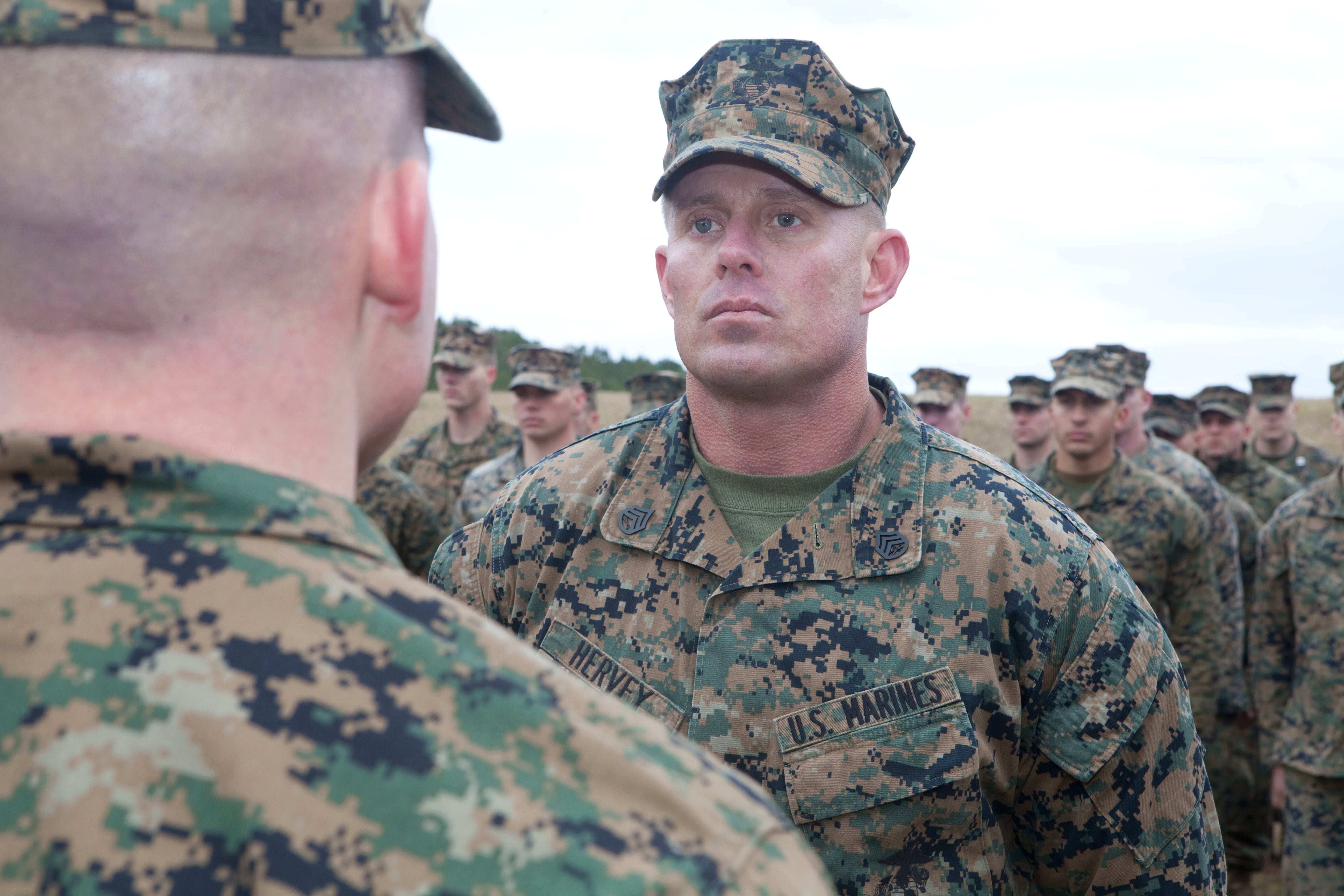
Staff Sgt. Nathan Hervey
Photo Credit: Staff Sgt. Mark Morrow/Marine Corps
Dixon, who was a lieutenant colonel in 2011, was remanded to a staff job for two years, his promotion and follow-on assignment delayed until the commandant, then-Gen. James Amos, was satisfied that the battalion commander didn't bear greater responsibility for the incident it saw hicareer limbosat in a staff job as his promotion to colonel and next assignment were delayed. He was finally promoted to colonel 2014, and now as the chief of staff for Joint Task Force Civil Support at Fort Eustis, Virginia, which oversees the military's first responders for chemical, biological and nuclear incidents.
Both Parker and Dixon said 3/2 accomplished too much on that deployment to allow knew that one negative incident to define the Marines — or the battalion — forever.
"The battalion time and again, day after day, patrol after patrol, demonstrated professional performance at the most junior levels," Dixon said. "My corporals, sergeants, those individual Marines and corpsmen did their job and did it well."
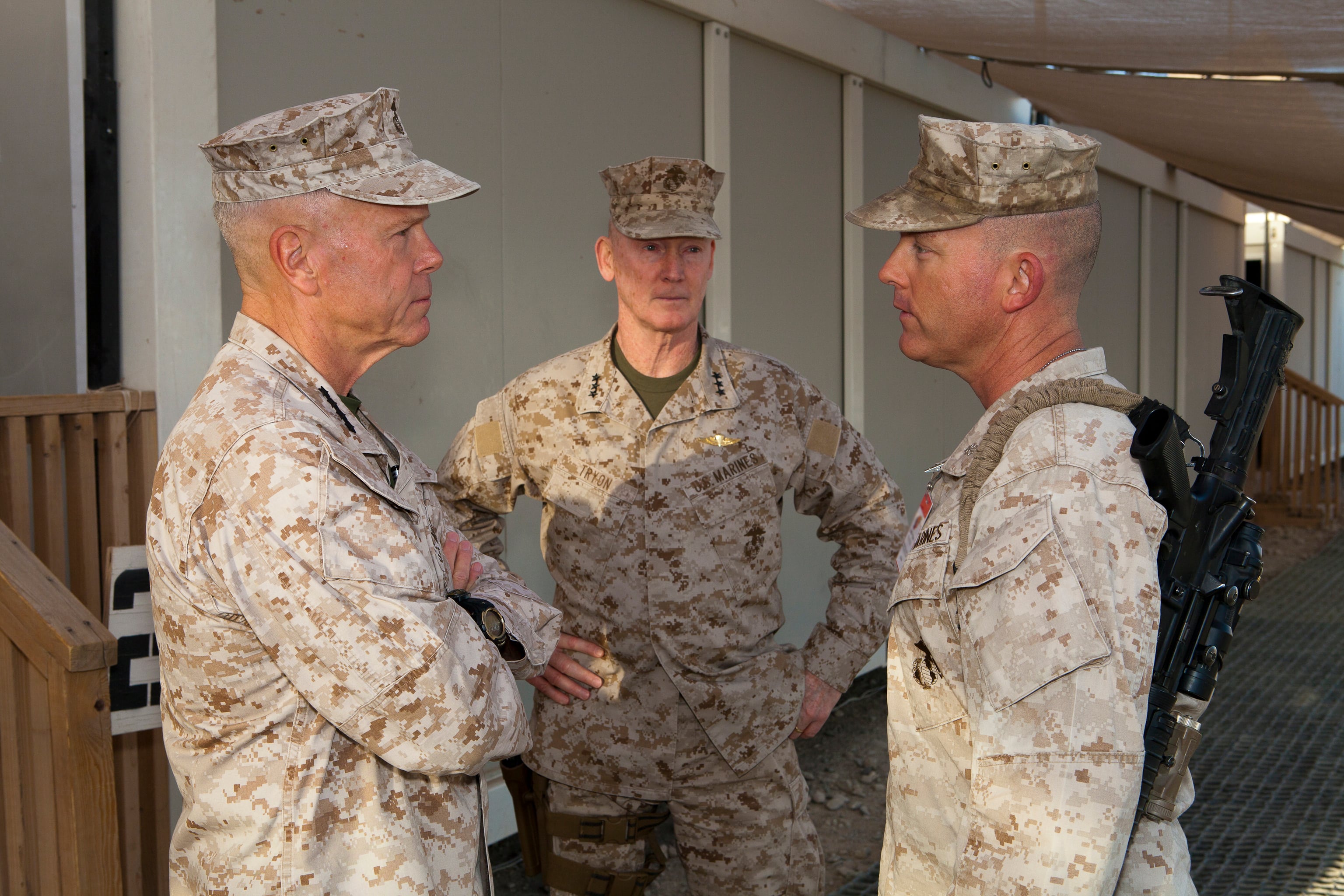
Then-Commandant Gen. Jim Amos, left, speaks with Lt. Gen. Richard Tryon, center, and then-Lt. Col. Chris Dixon, right, in Afghanistan.
Photo Credit: Sgt. Mallory VanderSchans/Marine Corps
Dixon, who was a lieutenant colonel in 2011, sat in a staff job as his promotion to colonel and next assignment were delayed. He was finally promoted to colonel 2014, and now as the chief of staff for Joint Task Force Civil Support at Fort Eustis, Virginia, which oversees the military's first responders for chemical, biological and nuclear incidents.
It's a sensitive issue for the Marine Corps, too. Some of the Marine Corps' most senior leaders, including the commandant at the time, were investigated for mishandling the cases. They were later cleared of any wrongdoing.
Despite the pain it brought to many, Dixon knew that one negative incident would not define his Marines — or that battalion — forever.
"The battalion time and again, day after day, patrol after patrol, demonstrated professional performance at the most junior levels," he said. "My corporals, sergeants, those individual Marines and corpsmen did their job and did it well."
Celebrated battlefield innovation
When 3/2 left Afghanistan the region in late 2011, the Marines who replaced them saw better security as a result of what Dixon's battalion had accomplished. The 3/2 Marines worked to build up the Afghan soldiers and police who would provide security for that part of Helmand province. Strained local troops and the police force, and small teams of troops Marines pushed the edges of the battle space to drive insurgents from out of the region. And while the Marines tried to keep things stable, things often got kinetic.
"The enemy did not like it," Dixon said. "They fought us hard."
The Marines responded with true battlefield innovation. The same sniper team that , which later came under scrutiny for the war-zone video, was credited with incorporating M1 Abrams tanks into their missions, — a move that enabled them to kill hundreds of insurgents. Top Marine leaders, including the commandant, visited the battalion in theater during its deployment to congratulate them on their successes.
Life for the Afghans was also better with 3/2 in the region. Dixon’s Marines built a road that connected Musa Qala to Now Zad, opening opportunities for which opened up commerce and connecting the districts to Lashkar Gah, Helmand's the capital and of Helmand province and a political and economic center.
"They did a fantastic job, and that's what I want that battalion to be known for," Dixon said. "What they did was phenomenal, and you could see it."
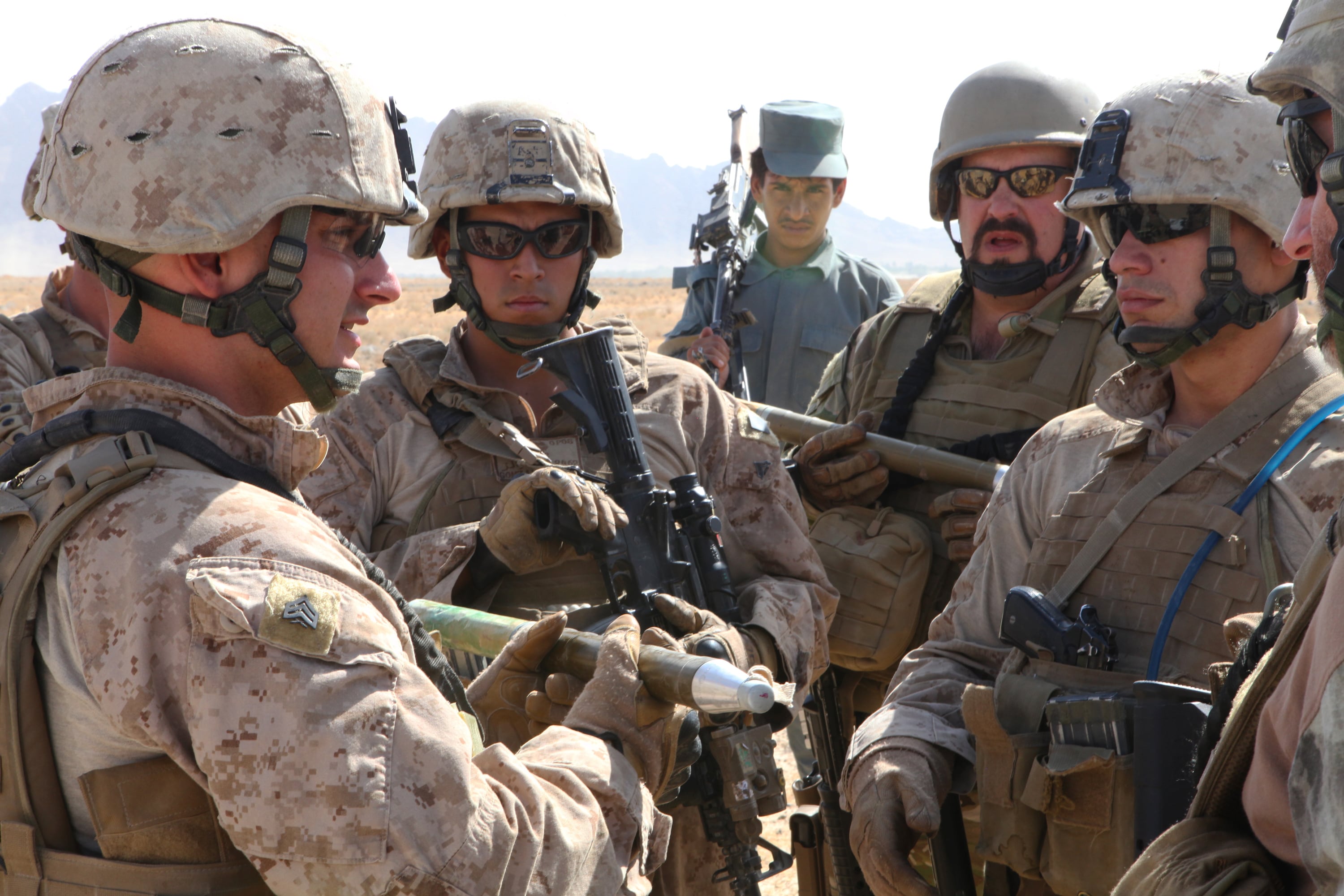
Sgt. Jeremy Lake, with 3rd Battalion, 2nd Marines, trains local police officers during the unit's 2011 deployment to Afghanistan.
Photo Credit: Lance Cpl. Clayton Vonderahe/Marine Corps
Once that road was opened up, it was as though day-to-day life improved was infused back into Now Zad and Musa Qala, Dixon said. Markets thrived and the locals appreciated the security Marines provided along the road. And that wasn't all 's just one example of how the 3/2 Marines affected change in the region, Dixon said.
"We had the Afghan people actually telling the Taliban, 'Hey if you want to attack the Marines, don't do it here on our road,'" he said. "They liked their road — you'd see kids playing near it, families walking on it and enjoying it — a simple road."
As he prepared to speak at Dixon prepared to watch Maj. Gen. Brian Beaudreault, the commanding general of 2nd Marine Division, present Parker's with the Silver Star ceremony, Dixon said the moment would have even deeper meaning for much more for his battalion.
"We’re honoring Parker," he said, "but at the same time, we need to honor all of them," Dixon said. The six Marines and the sailor that were killed, we need to talk about our wounded, we need to talk about the daily performance of the individual Marines and sailors."
Still fighting for recognition
Dixon said that Parker's award is the last of the unit's administrative delays. But at least one other One 3/2 family remains hopeful that the Marine Corps will recognize their hero it will lead to Parker’s Silver Star leads to other members of the battalion receiving recognition.
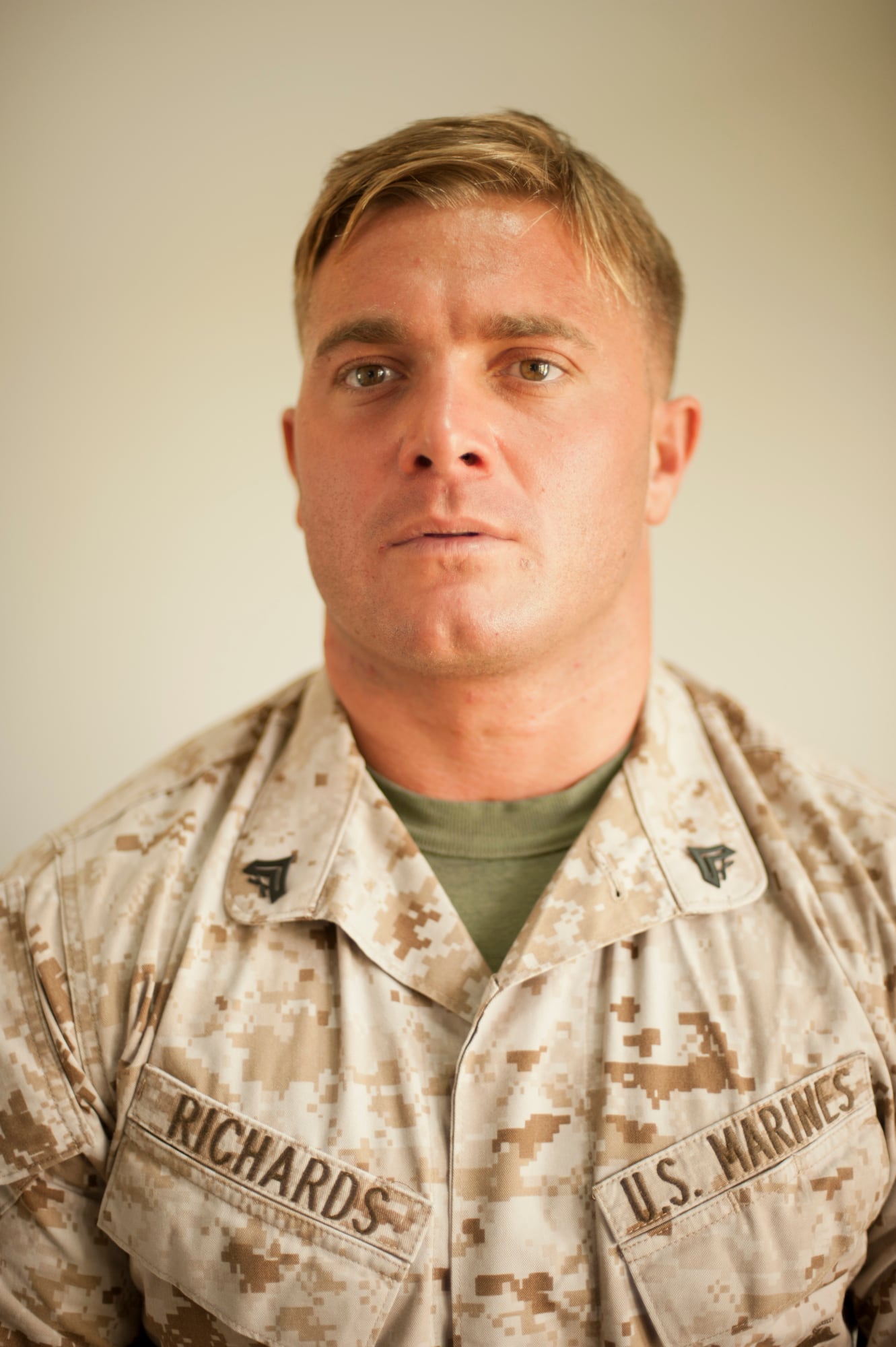
Cpl. Rob Richards
Photo Credit: Mike Morones/Staff
Medically retired Cpl. Rob Richards, one of the scout snipers involved in the controversial video, was nominated put up for a Bronze Star with "V" for his actions during 3/2's the 2011 deployment. Richards had been put up for the valor award, which Dixon signed, for braving enemy fire to retrieve a dead insurgent's weapon before it fell back into enemy hands. Dixon endorsed the award before the scandal erupted, but today it oughly five years later, that award remains in limbo.
Richards, a sergeant who was busted down in rank to corporal as a result of the video for his involvement in the video, died unexpectedly suddenly at his home in August 2014 after receiving an honorable discharge leaving the Corps. He was 28 years old. His wife, Raechel, said that knowing Parker's is about to receive his Silver Star is "extremely satisfying," and gives her hope that for other deserving Marines from members of 3/2 will be recognized, too for combat heroism.
Richards' wife, Raechel, said knowing Parker is about to receive his Silver Star is "extremely satisfying," and gives her hope for other deserving members of 3/2 to be recognized for combat heroism.
"It should never have taken this long for the deserving Marines of 3/2, or any Marine, to be awarded an honor that they earned with their blood, sweat and tears," Raechel Richards told Marine Corps Times. "... I truly hope that the Marine Corps will do the right thing, and that my husband will be included in that group of deserving Marines."
Richards' and her husband’s supporters continue to advocate for his Bronze Star that award to be issued. Quoting the Marines' motto She said she knows Marines are "always faithful," his widow said all she can do is hope holds out hope that one day, her hero receives the award for which the citations were written.
"He is not here anymore to fight for his Bronze Star — and honestly he was much too humble of a person to have ever pursued it," she said. "But I'm still here, and I have amazing people standing by my side to make sure that his honorable and exceptional service is recognized by this country."
Today, March 19, marks exactly six years since Rob Richards was nearly killed after stepping on an improvised explosive during his second deployment to Afghanistan. Raechel Richards said they used to call it his "Alive Day."
But the date holds other meaning, she said. On March 19, 2013, Rob Richards was sent to a legal hearing to learn if he would be court-martialed for making the video. "It's a bitter-sweet day now because there are no more 'Alive Days' to celebrate," she added. "Now I guess I'll need to refer to it as the date Rob got a second chance. Maybe it'll be good luck in getting this award pushed through."
Gina Harkins is the editor of Marine Corps Times. She oversees reporting on Marine Corps leadership, personnel and operations. She can be reached at gharkins@marinecorpstimes.com.




